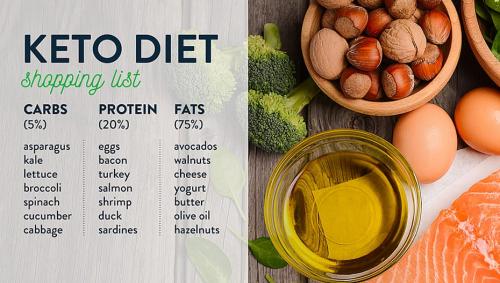Table of Content
Overweight/Obesity is a medical condition that occurs when the weight or body fat of a person exceeds the required weight or body fat that might affect their health. Obesity in India has reached epidemic proportions in the 21st century affecting 5% of the country's population. Many developing countries that are steadily becoming more obese are being followed by India. 48.3 million Indians likely to be obese by 2025, says World Obesity Federation.
A BMI of 30 or over suggests that an individual may have obesity. When obesity reaches the extreme point it leads to serious health issues.
Dieting is the option that people look for when it comes to weight loss. One of the latest and the most popular fads in the world of diet plans is a ketogenic diet. Although keto diet is about 100 years old, scientists are still discovering new things about it every day. A standard keto diet contains 50-60 percent fat, 35 percent protein and just 10-15 percent carbs. The excessive reduction of carbohydrates from the diet enables the body to burn fat through the process of ketosis.
It works best for people who are extremely overweight, especially if they are more than 100 kg and are facing extreme health conditions as weight loss happens really quickly in keto diet. It not only burns fat but also lessens the inflammation of our body.
The transition phase from normal diet to keto diet can be challenging as it might lead to nutrition deficiencies due to extremely low carbs intake and may cause side effects like muscle spasms, nausea, diarrhea and constipation.
Being on keto diet following are the mistakes that we make which is followed by their side effects. However, if it is taken along with right proportion of supplements, the keto diet can be the best thing for you.
- Consumption of wrong fat
When you are consuming 50-60 percent fat, you should know the difference between good fat and bad fat. It’s a huge mistake if you choose the wrong fat. Intake of bad fats in huge quantity can reverse the result of the diet.
People who are on keto diet can take omega-3 fatty acids from supplements like Docosahexaenoic acid (DHA) which is plentiful in oily fish, such as salmon and anchovies in combination with Eicosapentaenoic acid (EPA) and fish oil and from natural foods like fatty fish and healthy oils like ghee, coconut oil, etc. Omega-3s are good in reducing inflammation; reduce heart disease risk, maintaining healthy heart and proper brain functioning; as well as asthma, cancer, menstrual problems, hot flashes, hay fever, lung diseases and kidney diseases. This is definitely a good fat and great to go with your diet.
- Removing all the vegetables from your diet
Vegetables provide you many essential nutrients which are necessary for your body. Most vegetables contain carbs but it does not mean that you remove vegetables completely from your diet.
It’s just a matter of adding the right amount and variety of vegetables so that you receive all the nutrients but make sure you do not add too many carbs to your diet as well.
- Magnesium
The transition from normal diet to keto diet can be uncomfortable in its initial stage. You may experience some symptoms like nausea, cramps, fatigue and aches. These symptoms are called keto flu and are more likely to appear during the first two weeks. When on keto diet, you cut on magnesium-rich foods like beans and fruits, both are high in carbs.
This creates a need for sufficient magnesium, potassium and sodium supplements which can reduce the incidence of muscle cramps and spasms; can also reduce difficulty sleeping and irritability. First few days are critical and hence you should be well prepared for such situations otherwise you will put a permanent stop on the diet. Magnesium boosts your energy levels, improves immunity and also regulates blood sugar levels. Other food sources include spinach, pumpkin seeds, mackerel and avocado.
- Sudden consumption of too much fat
50-60 percent of keto diet is fat which may take a toll on your digestion. When you start cutting carbs on a keto diet, beginners often reduce carb intake completely. This leads to the consumption of too much fat. This sudden drastic change can enable you to lose excessive weight. Constipation is also a common side effect of keto diet. You may also experience nausea and diarrhea.
Thus the reduction in carbs should be gradual. Fats should also be consumed in restricted amount. You should plan your diet in such a way that you add fat and reduce carbs in moderation step by step. The correct method will help you enjoy your new diet. Also try getting your hands on digestive enzymes supplements that can help you restore digestion if you feel bloated and constipated while on keto diet.
- Not drinking plenty of water
When on keto diet, if you are not drinking enough water you may feel fatigued, get muscle cramps and headaches and may also experience a lot of water loss due to drop in levels of magnesium, potassium and sodium.
Proper hydration is essential for the functioning of the human body on keto diet or on normal diet. While deciding what to eat and what not to eat, you can’t afford to miss out on water consumption. Drink plenty of water to flush all the toxins out and ensure the healthy functioning of the body. Besides, you can also have coconut water, a drink is low in calories and extremely rich in electrolytes. Other options could be Orange juice, watermelons and leafy greens that can also provide you with sufficient electrolytes. Also, adding electrolyte supplements to your diet will help you keep hydrated.
Conclusion
On average, people can reduce around 10-12 kg in a matter of 3 months. Keto diet can be a boon to mankind in remarkable weight loss and aiding in other ailments like cancer, arthritis and many more, only if taken in the extent to meet the demand of one’s body.
.webp)





_1735214375.webp)








